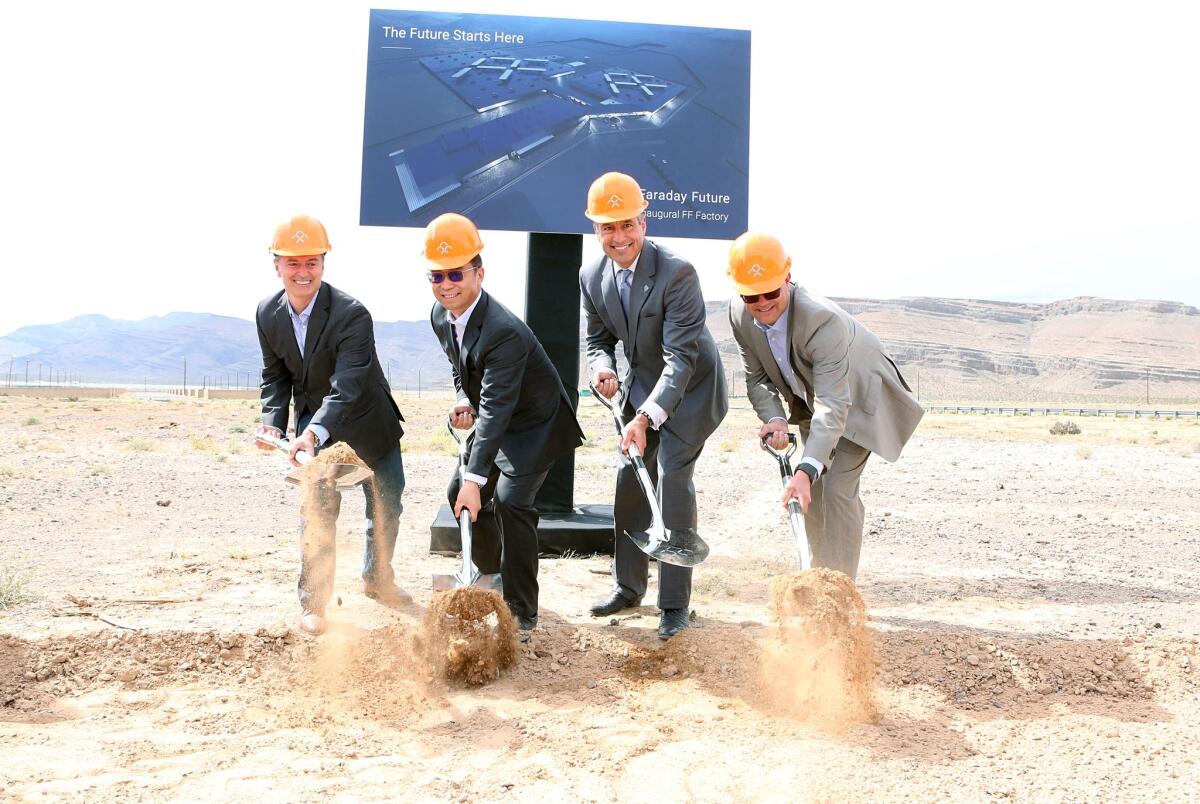Snapchat, Faraday Future faced questions on diversity before landing tax credits

- Share via
Shareholders, industry groups and employees have urged high-tech companies to hire more women and minorities. Now, a new proponent for tech diversity has emerged: A state committee that awards tax credits.
The California Competes committee awarded app maker Snapchat Inc. and Chinese-funded electric car start-up Faraday Future millions of dollars in tax breaks Thursday. But first, both of the Southland start-ups fielded questions from a committee member about employing and providing leadership opportunities to people of all backgrounds. Neither the committee nor state officials have the power to hold companies accountable for any promises, but at least one member is hoping to change that.
Advocates for gender and racial diversity in high-tech jobs want more equity in the fast-growing fields, where women leaders are few, minorities are underrepresented and frustrations of pay disparities simmer.
The dominance of white and Asian men in the tech workforce has worried both companies and outside experts, who predict the shortage of highly skilled workers will grow more severe as the number of computing jobs across the economy surges. There’s hope for avoiding the worsening worker crunch -- and increasing fairness -- through increased educational opportunities and greater awareness of biases that might be thwarting minorities.
“We want to see companies act in their own enlightened self-interest, but that does not always play out,” said Natasha Lamb, director of equity research for Arjuna Capital, whose inquiries led Facebook Inc. and Microsoft Corp. to disclose pay differences between genders.
“The state and and its taxpayers should want these companies to thrive, and diversity is important in the equation for success,” Lamb said.
The new awards for Snapchat, Faraday Future and about 100 other companies come from a 2-year-old effort aimed at increasing the number of well-paying jobs in the state. About $70 million in tax credits were approved Thursday, bringing total commitments to over $280 million.
At least $53 million has gone to recognizable names in tech from San Francisco, Silicon Valley and Los Angeles. The recipients include Samsung Electronics Co., augmented reality tech developer Magic Leap Inc., computer game maker Riot Games Inc., credit check app maker Credit Karma Inc. and ad tech provider OpenX Technologies Inc.
To apply the tax breaks, companies must annually hire a specific number of people with a certain level of pay and hit goals for spending on equipment, property and other items. A few companies have already forgone credits after circumstances changed.
At least one official wants another requirement added. Madeline Janis, a member of the California Competes committee, says companies should have to make diversity commitments.
“This is the fundamentals of what we’re about: inclusion for people who really need it,” said Janis, a co-founder of social justice advocacy group Los Angeles Alliance for a New Economy.
State officials say legislation would be required to seek corporate demographic data and introduce diversity as a criteria; existing law limits them to studying 11 factors, including how economically disadvantaged the area is where jobs are being created and the “strategic importance” of the business to the state.
Though state negotiators can’t scrutinize the diversity issue, Janis vowed to use her seat on the final-approval table to raise concerns.
At a meeting in Sacramento on Thursday, she queried two women from Faraday Future about hiring plans for the eventually approved $12.7-million tax credit.
Crystal Peterson, the Gardena company’s human resources director, said they launched with a plan to hire women and people of color by recruiting at universities and technical schools, offering tuition reimbursement and flexible schedules and training managers to look for diverse employees.
“Finding the talent for women and other diverse candidate pools isn’t easy,” Peterson said. “You have to have a plan. You have to commit to it within the organization and community.”
The specific measures left Janis satisfied that the company -- which plans to hire about 2,000 people in California over the next five years -- had seriously considered diversity.
Janis asked similar questions of Snapchat, whose representative acknowledged the Venice company is widening its candidate pool with measures such as hiring a head of diversity recruiting.
But Janis abstained from voting on the $5-million credit for Snapchat, feeling uneasy about investing state funds in a revenue-generating company that’s already received $1.4 billion from venture capitalists and appears to have access to more.
To justify the credit, Snapchat should have to go “above and beyond,” potentially using the extra cash to help people who need special training or have a disability or other barrier to employment, Janis said.
Snapchat declined to comment or release data about its workforce.
If state economic development officials get in the business of mandating diversity, they should focus on evaluating hiring processes rather than establishing quotas, said Emily Yukich, an attorney at Fox Rothschild in Los Angeles who represents small businesses and start-ups.
Numerical goals could result in minorities getting stuck in low-paid gigs or general inflexibility, she said. But addressing whether, for example, a corporate hiring committee is well-represented would be a valuable way to target root causes of homogeneity.
Diversity questions are unlikely to drive away applicants because someone always wants help to expand in California, Yukich said.
For instance, Snapchat, which won the credit with a vote of 4-0, emphasizes its desire to keep Venice as headquarters, with potentially 1,600 employees by 2020.
As Jon Locascio, Snapchat’s tax director, told the committee Thursday, “We absolutely need the money.”
Twitter: @peard33
Dave reported from Los Angeles and Dillon from Sacramento.








